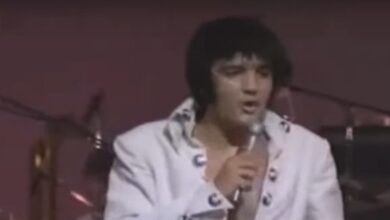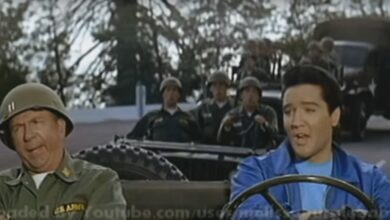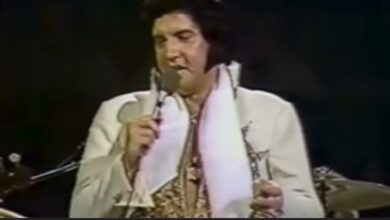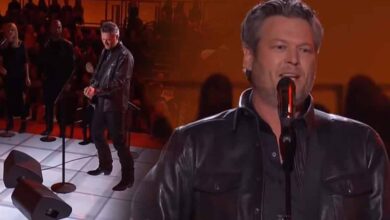When he hits verse three, it’s the best sound ever created by a person
Elvis Presley’s live performance of “Never Been To Spain” in 1972 is a standout moment in his storied career. Written by Hoyt Axton, the song was originally recorded by the band Three Dog Night and released in 1971, but Elvis’s version has become one of the most beloved and enduring covers of the song. His rendition captures the essence of the original while infusing it with his own unique style and energy, making it a memorable highlight of his live performances during that period.
The song features Elvis’s signature blend of rock, blues, and soul, with a driving rhythm section, powerful horns, and his own passionate vocals. The lyrics tell the story of a man who has never traveled the world but still feels a sense of wanderlust and adventure. This theme of yearning for exploration and new experiences resonates deeply with many listeners, adding to the song’s enduring appeal.
Throughout the song, Elvis delivers a dynamic and captivating performance, showcasing his incredible range and charisma as a performer. His vocals are powerful and soulful, and he infuses the song with his own unique style and flair. The way he interprets the lyrics and conveys the emotions behind them demonstrates his deep connection to the music and his ability to bring a song to life.
The performance was recorded live in Las Vegas, a city where Elvis had become a regular performer and a major draw for audiences. His live shows in Las Vegas were known for their high energy and spectacular production, and “Never Been To Spain” was a perfect fit for this environment. The recording captures the electric atmosphere of the concert, with the audience’s enthusiasm palpable in the background.
Elvis’s incredible stage presence and ability to connect with his audience are on full display in this performance. He effortlessly commands the attention of the crowd, drawing them in with his magnetic energy and infectious enthusiasm. His performance style, which combined a natural charisma with a deep emotional connection to the music, made him one of the most compelling live performers of his time.
Beyond the technical aspects of his performance, “Never Been To Spain” showcases Elvis’s ability to interpret a song and make it his own. His rendition adds a new dimension to the song, highlighting its emotional depth and bringing a fresh perspective to the lyrics. This ability to reinterpret and reinvent songs was one of the hallmarks of Elvis’s career, and it is on full display in this performance.
Elvis Aaron Presley, born on January 8, 1935, in Tupelo, Mississippi, rose from humble beginnings to become one of the most iconic figures in music history. His early exposure to gospel music in church laid the foundation for his distinctive vocal style, which combined elements of rock, blues, and soul. Elvis’s meteoric rise to fame began in the mid-1950s with a string of hit singles and electrifying live performances that catapulted him to stardom.
Throughout his career, Elvis continued to push the boundaries of musical expression, exploring a wide range of genres and styles. His ability to connect with audiences on a deeply emotional level earned him a dedicated following and cemented his status as the “King of Rock ‘n’ Roll.” Despite facing personal challenges and setbacks, Elvis remained dedicated to his craft, leaving behind a legacy that continues to inspire generations of musicians and fans.
In conclusion, Elvis Presley’s performance of “Never Been To Spain” in 1972 stands as a testament to his enduring impact on the world of music. His heartfelt rendition of the song resonates with listeners, offering comfort and reassurance in times of need. As one of his many contributions to the musical landscape, Elvis’s version of “Never Been To Spain” remains a timeless classic that continues to uplift and inspire audiences around the globe. His ability to evoke emotion and connect with audiences remains a hallmark of his extraordinary career, solidifying his place as a true legend in the annals of music history.



